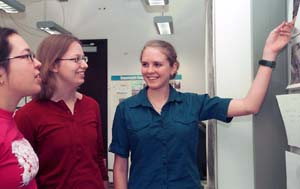Today, more than six months before her 21st birthday, Laurel E. Griggs of Titusville, Fla., will graduate with a double major in systems science and mathematics in the School of Engineering & Applied Science and in Environmental Studies in Arts & Sciences.
She will also receive a master’s degree in earth and planetary sciences in Arts & Sciences. She will graduate summa cum laude.

Griggs pulled away from her contemporaries in high school when she took advance-placement and dual-enrollment courses in calculus, physics and environmental science at her local junior college and the University of Central Florida.
Griggs, who received a full-tuition Langsdorf Fellowship from the engineering school, averaged about 18 hours per semester of both research and course work at Washington University. Her summers were spent researching in Hawaii and Arizona.
When Griggs starts her doctoral work in hydrology and water resources this fall at the University of Colorado, she will be in possession of a Hertz Fellowship and a Fulbright Fellowship. She also won a National Science Foundation Graduate Fellowship but won’t use it because the Hertz Fellowship pays for everything.
She won a Washington University Women’s Society Leadership Award and the engineering school’s Sullivan Professional Achievement Award.
She will use the Fulbright Fellowship to spend all of 2004 in South Africa working out of the University of Natal on a water resource management project.
Deeply committed to the environment, Griggs said she chose Washington University because of the Hewlett Program, which allows approximately 15 incoming freshmen each year to tailor their undergraduate degrees with an environmental emphasis and lots of field research. “Pathfinder” is the name that grew out of the Hewlett Program, in the Division of Natural Sciences and Mathematics in Arts & Sciences, and it also is available to engineering students.
“The Pathfinder experience drew me to Washington University and shaped the course of my education here,” Griggs said. “The technology I learned using satellite imaging and modeling stimulated my master’s research. The group of Pathfinder students was outstanding.
“Washington University is a great place to go to college. Students and faculty are enthusiastic about learning.”
Griggs’ faculty advisers are Hiro Mukai, Ph.D., professor of systems science and engineering and director of the department’s undergraduate program, and Raymond E. Arvidson, Ph.D., the James S. McDonnell Distinguished University Professor and chair of earth and planetary sciences. Arvidson directs the Hewlett Program, which produced a Rhodes Scholar, Sarah Johnson, in 2000 and another Fulbright Fellow, Sean Rovito, in 2001.